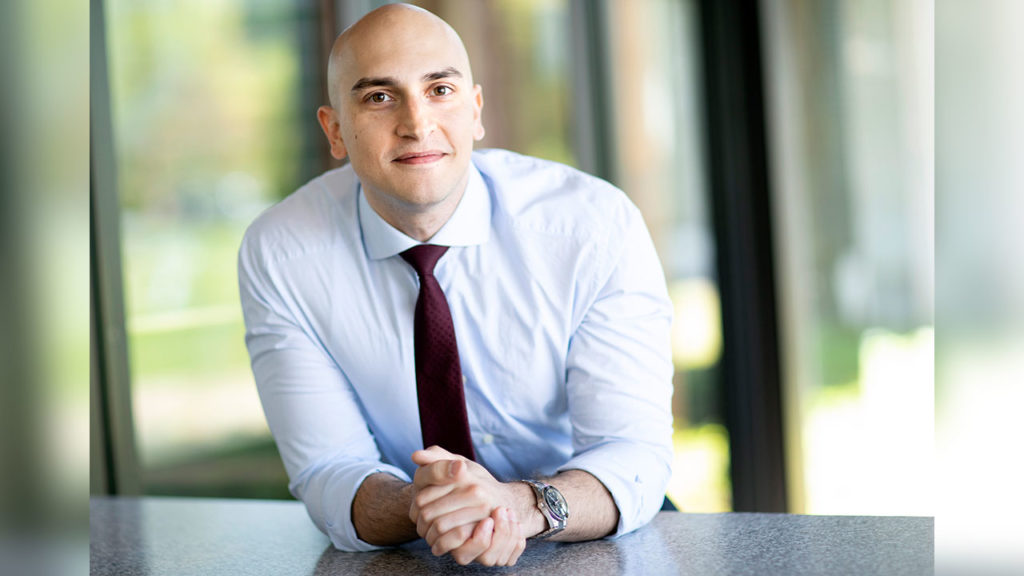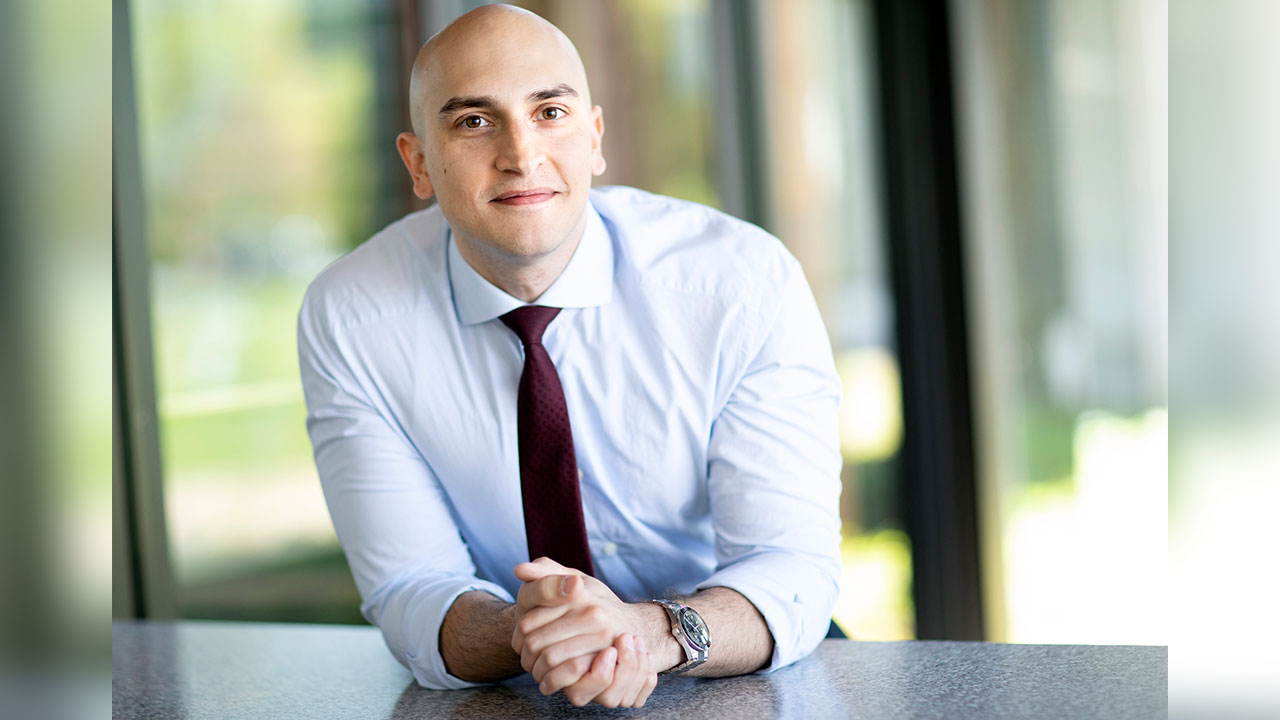
Jason K. Karimy, a third-year student at the Frank H. Netter MD School of Medicine at Quinnipiac University. Photo by Autumn Driscoll of Quinnipiac University.
Jason K. Karimy of New Haven, a third-year student at the Frank H. Netter MD School of Medicine at Quinnipiac University, has been selected to receive a Howard Hughes Medical Institute Fellowship (HHMI), which allows exceptional medical, veterinary and dental students to spend a year conducting rigorous research at top institutions throughout the U.S.
Karimy – the first student selected from Quinnipiac’s five-year-old medical school – was among 66 students who received the 2018 HMMI Fellowship that provides $43,000 in grant support. Beginning this summer, each fellow will spend a year pursuing basic, translational or applied biomedical research at one of 38 academic or nonprofit research institutions across the United States.
Karimy will spend the year at Yale University, working in the lab of Dr. Kristopher Thomas Kahle, assistant professor of neurosurgery and of cellular and molecular physiology; pediatrics and cellular and molecular physiology; and director, neonatal and congenital anomaly neurosurgery.
“Receiving an HHMI research fellowship is an outstanding accomplishment for Jason Karimy,” said Dr. Bruce Koeppen, founding dean of the Frank H. Netter MD School of Medicine. “These fellowships are highly competitive, and it speaks to the quality of his research. The school is extremely proud of this special accomplishment.”
“Jason epitomizes the ideal of the ‘physician-scientist,’ and he has created a unique niche with his novel research into the causes and treatment of post-hemorrhagic hydrocephalus,” said Carolyn M. Macica, Ph.D., associate professor of medical sciences at Quinnipiac and the mentor for Karimy’s capstone project, who runs a program with Netter medical school student volunteers for underserved middle school students in New Haven. “He is truly exceptional. Despite the demands of medical school and research, he is also a devoted advocate of science education, serving as a tireless volunteer for the Science Friday program.”
Karimy, 32, who is originally from Littleton, Colorado, graduated with a bachelor of science degree from the University of Colorado, Denver and earned a master’s degree in molecular medicine from the University of Maryland, Baltimore. It was there, in 2012, that he began working with Kahle to develop a novel surgical method to measure the rate of cerebrospinal fluid secretion in a rodent model of post-hemorrhagic hydrocephalus (PHH). PHH primarily affects very premature infants and is a common complication of intraventricular hemorrhage (IVH), bleeding into the ventricles of the brain, which can be fatal or cause lifelong cognitive and motor deficits. Currently, the only available treatment is a surgical shunt, an invasive neurosurgical procedure to insert a catheter into the brain and remove the excess cerebrospinal fluid to relieve pressure.
When Kahle moved to Yale, Karimy’s acceptance to the nearby Frank H. Netter MD School of Medicine enabled them to continue their research together. Karimy has been working in Kahle’s laboratory since he started medical school.
Karimy’s research has focused on finding out why infants with IVH are at higher risk to develop hydrocephalus; how this relates to other types of hydrocephalus; and if there are non-invasive alternatives that could eliminate shunt dependence and the complications associated with surgical shunts, such as infection, that require subsequent surgeries.
In addition to developing a new technique to measure the rate of cerebrospinal fluid secretion, Karimy discovered a correlation between the immune system and the rate of cerebrospinal fluid production. He found that when blood enters the ventricles of the brain, it activates the immune system to send inflammatory signals that increase the rate of cerebrospinal fluid production, leading to the formation of hydrocephalus. To stop this immune response and prevent hydrocephalus, Karimy discovered that a specific type of immune receptor in the brain can be inhibited by intravenous drugs that are FDA approved for other uses. At Yale, he will work with Dr. Kahle to determine the best time to administer these drugs and whether this treatment will work in other forms of hydrocephalus.
“Not only is Jason very talented, he is a trailblazer, inspiring other students to follow this path,” said Dr. Kahle, who noted that Karimy –– a student at a relatively new medical school that focuses on clinical medicine –– successfully competed for the HHMI fellowship with students from top academic medical schools. “I have high expectations for him as a future neurosurgeon and scientist, and I expect that we will achieve the ultimate goal of translating these findings into clinical treatments for use in the PHH population.”
After completing the HHMI Fellowship, Karimy will return to Quinnipiac to complete his final two years of medical school. He hopes to become a pediatric neurosurgeon and pursue a career as a physician-scientist.

Jason is a very impressive, highly intelligent doctor and a diligent worker. Selfless and humanity inspiring individual.